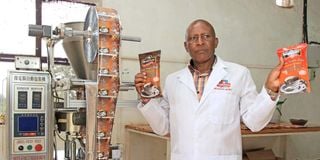Farmer reaps big from roasting his own coffee

Thuo Mathenge displays his product, Brade Gate Coffee, which he manufactures in Nyeri.
What you need to know:
- With payment for coffee taking over a year to reach the farmer’s pocket, Thuo Mathenge decided to take up the entire coffee value chain as opposed to only the production bit, which has been the focus for many farmers.
- Using locally assembled machines, and only importing core parts of the roaster, Mr Thuo has so far managed to process over 30 tonnes of coffee that he produces from his 45 acres.
- He attributes the myriad of challenges affecting coffee farming to barons in the sector that have held farmers at ransom.
- His coffee is roasted into two types: the dark roast and the medium roast at 100 degrees Celsius and 80 degrees Celsius respectively.
As coffee prices tumble and farmers abandon their plantations, one entrepreneur in Nyeri County has taken matters into his own hands by packaging and marketing his own coffee.
With payment for coffee taking over a year to reach the farmer’s pocket, Thuo Mathenge decided to take up the entire coffee value chain as opposed to only the production bit, which has been the focus for many farmers.
A kilogramme packet of his Brade Gate Coffee earns him Sh2, 000, while an average farmer receives Sh40 per kilo for cherry delivered to their factory. Worth noting is that the highest paid farmer takes home Sh100 in a direct sale of a kilo of the produce.
“I tried selling my coffee in a cooperative but I was not breaking even, therefore I decided to pluck myself from the slavery that I was being subjected to,” he says.
Using locally assembled machines, and only importing core parts of the roaster, Mr Thuo has so far managed to process over 30 tonnes of coffee that he produces from his 45 acres.
This is the same coffee that is served in a number of eateries that he has opened in various parts of the country, a factor that has had a positive input in marketing his brand of coffee.
Organic coffee farming
From the farm, the berries go through pulping, drying under sunlight, roasting and grinding and finally packaging, which comes in a kilogramme packet and 250 grams, which sell for Sh2,000 and Sh500 respectively.
“Real money from coffee farming can be realised in value addition, that is where all the efforts should be directed so that farmers can enjoy the fruits of their labour,” he says.
He attributes the myriad of challenges affecting coffee farming to barons in the sector that have held farmers at ransom.
“Coffee has lost its shine because of these brokers and cartels that impoverish the farmers for their own person gain,” Mr Mathenge comments, noting that it takes seven kilos of unprocessed coffee to produce a kilo of packed coffee.
To improve his profits, Mr Mathenge says he has transitioned to organic coffee farming which is cheaper compared to the conventional mode of farming since it cuts the cost of production by over 50 per cent.
He does not use any fertiliser or pesticides to protect his crop against diseases that ravage coffee such as coffee berry disease and coffee leaf rust, rather, he uses manure and compost to grow his coffee.
Medium roast
“I abandoned my farm for three years without picking to let it shed before I tended it and decided that it will be a chemical-free farm,” he said.
After sun drying the coffee to a moisture content of 11 degrees Celsius, the coffee is then sorted and graded from the highest grade to the lowest - AA, AB, PB and C, which are then hulled into clean coffee.
The dehusked coffee proceeds for roasting while the husks are turned into briquettes which are used within his farm while the remainder is sold.
His coffee is roasted into two types: the dark roast and the medium roast at 100 degrees Celsius and 80 degrees Celsius respectively.
“Both coffees are of the same quality, just that for the dark roast, we reduce the acidity and increase the alkalinity while balancing both for the medium roast, which is recommended for people with ulcers,” he noted.
Mathenge further stated that with agriculture being a devolved function and the revamping of the railway line, the region should be allowed to sell their coffee without necessarily relying on the Nairobi auction.





